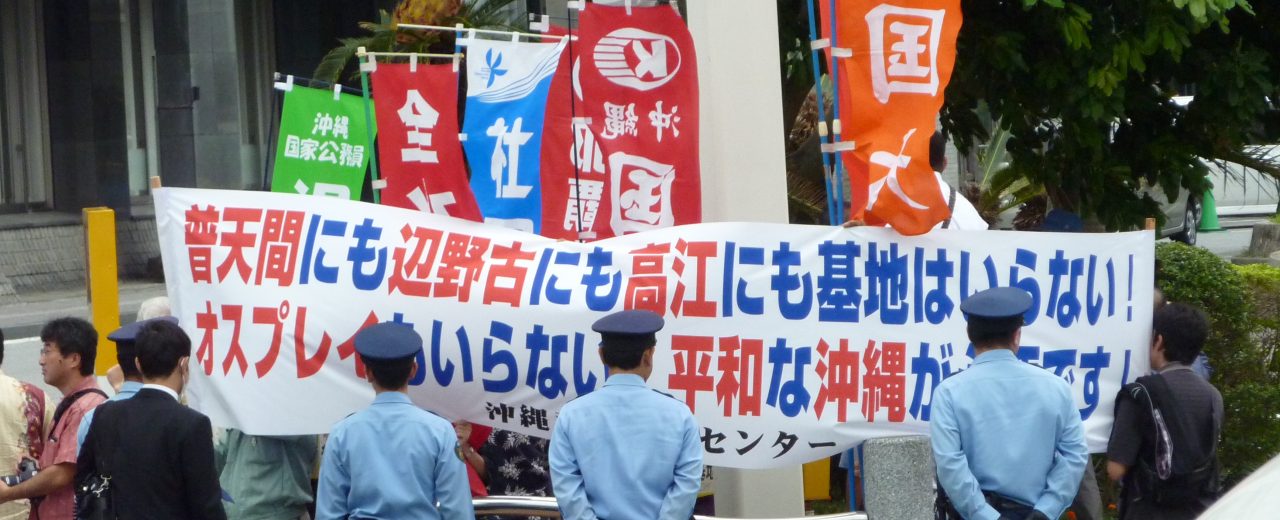GUA Statement on the 2019 Okinawa Prefectural Referendum
GUA opposes construction of a new offshore U.S. military base in Henoko, Okinawa. In line with this position, GUA supports voters in Okinawa Prefecture voting “No” on Henoko base construction through the Okinawa Prefectural Referendum (kenmin tōhyō) by February 24, 2019.
At the same time, GUA positions the Referendum in a complicated relationship between the democratic will of the Okinawan people and the exclusionary practices of Japanese democracy.
- The Okinawan democratic will has already been expressed by the election of Governor Denny Tamaki in September 2018 who campaigned explicitly on a platform that opposes the Henoko base plan. Governor Tamaki won with the highest number of votes (396,000) in Okinawan history with a 63% voter turnout. This in itself is a powerful testament to Okinawa’s opposition to the Henoko base construction plan.
- The democratic will of the Okinawan people has consistently been ignored by the Japanese government that is currently pushing forward with construction of the base on highly questionable if not outright illegal tactics. This is in reference to the Administrative Complaint Review Act (gyōsei fufuku shinsa hō) in which Japan has arbitrarily declared itself to be a “private individual” in order to protect state and national interests in pushing forth construction of the base in contradiction to laws that protect Okinawan autonomy.
- The Referendum reflects a problem endemic to Japanese democracy itself in that the central government has consistently trumped Okinawan autonomy in the name of national interests. Although the 1947 Japanese Constitution (Article 95, Chapter 8, Self-Government) provides the rights for public referendum, none have been enacted until August, 1996 in Maki, Niigata Prefecture in response to nuclear power plant construction, and in September 1996 when Okinawa that asked, “Should there be a review of the U.S.-Japan Status of Forces Agreement and a reduction of American bases in our prefecture?” Of those who voted, more than 89% voted “Yes.” That these referendums are frequently held in Okinawa Prefecture reflects how it is excluded from the interests of the Japanese state and Japanese people. In this sense, the Referendum is but another expression of Okinawan dissatisfaction with democracy in the Japanese state, but by no means the only one.
- The February 2019 Referendum has three options to express the prefectural citizens’ opinion on the Henoko base issue. They are “No to Henoko base construction,” “Yes to Henoko base construction,” and “No opinion either way.” The third choice was slipped in as a compromise between the Okinawa Prefectural Assembly and five conservatively aligned mayors. This internal division within Okinawa was facilitated by the conservative Liberal Democratic Party (LDP) in Japan that held study sessions on how to undermine the vote. As a compromise, Okinawan politicians finally agreed on allowing a third option “No opinion either way.”
- We recognize that the Referendum is not legally binding in Japan. Nonetheless, we caution against the potential negative interpretation of the outcome of the Referendum as undermining the historically established opposition to the Henoko base plan. Furthermore, we caution against forces who use the Referendum as a distraction tactic that diverts attention from the on going construction of the base in Henoko, Okinawa, which Okinawans will never relent in opposing.
2019年県民投票におけるGUA声明文
グローバルうちなんちゅ同盟 (GUA) は、沖縄県名護市辺野古の新米軍基地建設に反対する。辺野古の新基地建設に伴う埋め立ての是非を問う2月24日実施の県民投票では、埋め立てに「反対」を支持する。我々は県民投票の位置付けについて、沖縄の人々の民主的意志と日本の民主主義の沖縄に対する排他的慣行における複雑な関係性を表象したものと捉えている。
- 沖縄の民意は、2018年9月の沖縄県知事選で新基地建設反対を明確に表明した玉城デニー知事の選出で既に示されている。玉城知事は、沖縄の歴史上で最多の39万6千票を獲得し、投票率は63%を記録した。これは沖縄の民意が新基地に強く反対している証左だ。
- 沖縄の民意は、違法でなくともそれが非常に疑わしい建設工事を強行する日本政府に常に否定されてきた。これは、日本政府が沖縄の自治を保護する法律に反したり、新基地建設工事は国や国益のためと称して恣意的に「私人」を装って行政不服審査法を適用した行為にも現れている。
- 県民投票は、日本政府が国益の名の下に、沖縄の自治を踏みにじり続けているという日本の民主主義の特有の問題を反映している。1947年施行の日本国憲法(第8章95条地方自治特別法)は、住民投票の権利を保証しているが、条例が初めて制定されたのは1996年8月の新潟県巻町での原子力発電所の建設をめぐる住民投票で、続いて同年9月に沖縄県が実施した「日米地位協定の見直し及び基地の整理縮小に関する県民投票」では、約89%が必要性を認めた。これまで繰り返し沖縄で実施されてきた県民投票や住民投票は、日本という国や国民の利益から沖縄がいかにして排除されてきたかを示している。こうした意味上において、県民投票とは、日本の民主主義に対する沖縄の不満が別の形で表現されたものだが、それは決して唯一の方法ではない。
- 2019年2月の県民投票では、辺野古の新基地建設について県民が意思を表明するために「埋め立てに反対」「埋め立てに賛成」「どちらでもない」の3つの選択肢が用意された。3つ目の選択肢は、沖縄県議会と5都市の保守系市長らの妥協案として付け加えられた。この沖縄内部の分裂は、県民投票を回避する方法を学ぶ勉強会を開いた保守派の日本自由民主党系の議員らによってもたらされたもので、沖縄の政治家たちは、妥協案として「どちらでもない」という3つ目の選択肢を認めることに最終的に同意した。
- 我々は県民投票に法的拘束力がないことを認識している。しかし、それにもかかわらず、県民投票の結果が否定的に解釈されたり、歴史的に確立されてきた沖縄の新基地建設への反対を弱体化しうる恐れがあることを喚起する。さらに沖縄の人々に新基地建設反対を決して諦めない意思があるからこそ、この県民投票が現在進行中の新基地建設から我々の注意をそらす策略として権力側に利用されないよう留意せねばならない。
